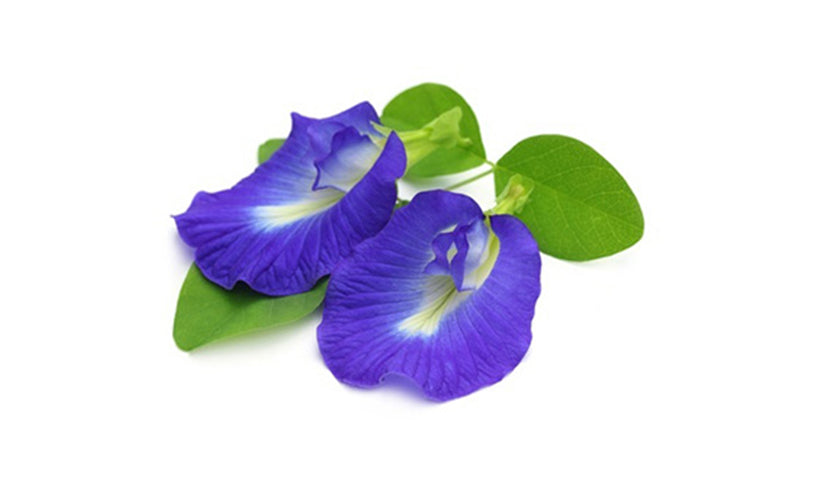Shankhpushpi is just like a morning glory plant and it is an all year-round herb with blue flowers and elliptical leaves. The plant is also known as aloe weed and is easily found in India specially in Bihar. It is the only known herb capable of effecting all the cognitive functions of the brain including learning, recalling, memory related and sleep related disorders. It is one of the wonderful herbs gifted by nature and has been given the name rasayana in Ayurveda.
Shankhpushpi flowers are like a shankha or conch which is where the name shankha (conch) and pushpi (flower) has been derived from. It is one of the well-known cerebrum tonics in Ayurveda along with Vacha and Brahmi but Shankhpushpi is the best for brain health.
Shankhpushpi or Convolvulus pluricaulis is a nootropic herb and has been used traditionally to enhance memory and cognitive functions. It contains a high percentage of alkaloids, flavanoids, steroids, carbohydrates, glycosides, gums, mucilage and proteins. All these metabolites provide practical uses of this herb in traditional systems of medicine and indicates high medicinal value of the plant.
Natural Constituents of Shankhpushpi
The roots of Shankhpushpi contain alkaloids such as Shankhapushpine, Scopoletin, Ceryl alcohol β-sitosterol, Convolamine, convosine, convolidine, confoline convolamine, convoline, onvolvine, fatty acids (Linoleic, mystic and palmitic acid), volatile oils and fatty alcohol. Along with these it also contains phenolic glycosides, tritrepenoids and starch.
All parts of Shankhpushpi are known to have therapeutic benefits and are extensively used in Chinese and Indian medicine. It is a very useful ingredient in Ayurveda for insomnia, cough, epilepsy, anxiety etc.
Shankhpushpi has a bitter and astringent taste and works on by regulating the neurotransmitters of the brain and balancing the vata, pitta and kapha doshas. It controls aggressive behaviour and mental disorders and helps induce a sense of calmness.
Its pharmacological effects and efficacies for various health ailments are:
Tranquilizer, antioxidant, anti-amnesic, neurodegenerative, immunomodulatory, anti-diabetic, hypolipidimic, cardioprotective, anti-catatonic, anti-ulcer, anti-bacterial, anti-fungal, anti-depressive, anti-stress, memory enhancer, concentration booster, mild anti-convulsant, anti-anxiety, anti-oxidant, carminative, adaptogenic, digestive stimulant, mild anti-inflammatory, diuretic, uterine tonic and aphrodisiac
Benefits of Shankhpushpi
-
Brain and Mental Health: Shankhpushpi increases intellectual capacity, is considered useful in diseases of supernatural origin, rejuvenates the body, enhances the aura of the body and gives it a healthy look. It rejuvenates the nervous tissues, alleviates insanity and emotional instability and promotes quality sleep. The plant is a valuable source for all kind of stress including traumatic and psychological.
- Shankhpushpi has the ability to improve scalp and hair health.
- It works as antidepressant.
- Helps manage the effects of Autism.
- Used as brain and nervine tonic and an anti-anxiety herb.
- Prevents rheumatic and arthritis pain due to its anti-inflammatory nature.
- Prevents excessive bleeding related to menstruation.
- Helps to cure wound, cuts, and abscess due to its anti-bacterial and anti-fungal nature.
- Control LDL, phospholipids and triglycerides levels significantly.
- Rejuvenates entire nervous system.
- Used for the treatment of convulsion, epilepsy and other brain disorders.
- Useful for diabetes, Alzheimer’s and dementia.
- Promotes good sleep and thus helps combat insomnia.
- Used to treat ulcers, high B.P, vomiting, bleeding and sun stroke.
Shankhpushpi and Safety: It is well tolerated by most people and a safe herb. Only some people
may feel little discomfort due to its bitter and astringent taste. It may cause low blood pressure if consumed in excess and is unsafe to consume during pregnancy.






